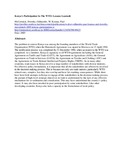| dc.description.abstract | The problem in context Kenya was among the founding members of the World Trade Organization (WTO) when the Marrakesh Agreement was signed in Morocco on 15 April 1994. The notification process was completed by 31 December 1994, when accession to the WTO was completed. As a member, Kenya is signatory to all WTO agreements including the General Agreement on Tariffs and Trade (GATT), the Agreement on Agriculture (AOA), the General Agreement on Trade in Services (GATS), the Agreement on Textiles and Clothing (ATC) and the Agreement on Trade-Related Intellectual Property Rights (TRIPS). As in many other countries, trade issues in Kenya involve a large number of stakeholders with diverse interests. For effective policy formulation, it is important that all the stakeholders are effectively involved in the decision-making process. This is because not only are trade matters, particularly WTO-related ones, complex, but they also overlap and have far-reaching consequences. While there have been bold attempts in Kenya to engage all the stakeholders in the decision making process, the pursuit of high-level strategic objectives in trade is undermined by the lack of any effective mechanism for co-ordination and consultation. This may have undermined the country’s policy stance. It may also have resulted in poor participation by some stakeholders. Like other developing countries, Kenya also lacks capacity in the formulation of trade policy | en |

